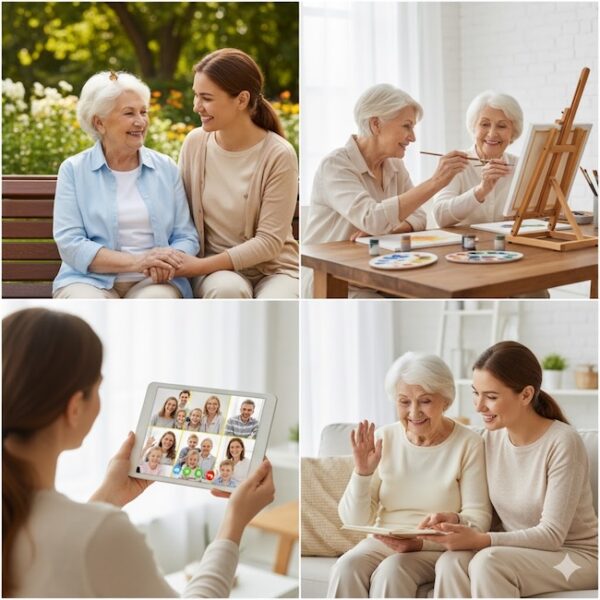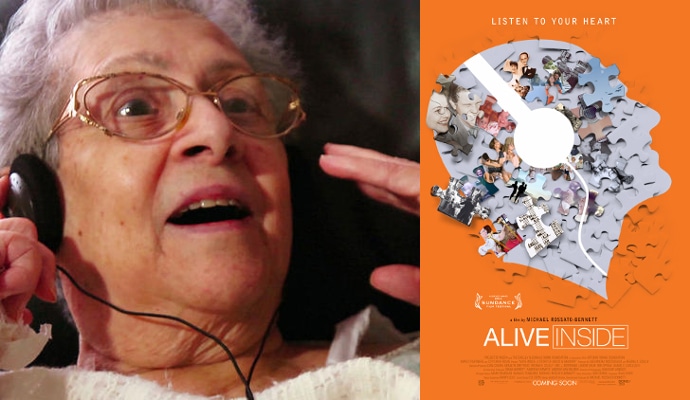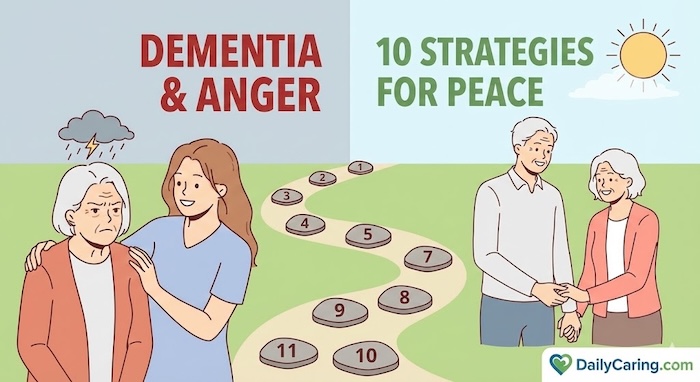Loneliness can be particularly profound for seniors living with Alzheimer’s or dementia, as cognitive changes may make social interactions more challenging. Yet personal connections remain vital for emotional well-being. Even when verbal communication becomes difficult, meaningful engagement can significantly improve mood, reduce agitation, and enhance quality of life.
This article explores four thoughtful, dementia-friendly strategies to combat loneliness, from sensory-based activities to simple ways of fostering nonverbal bonds. These approaches meet your loved ones where they are, helping them feel valued and connected at every stage of their journey.

Loneliness and isolation can worsen dementia symptoms and suppress the immune system. To combat this, Vineyard Johns Creek shares four meaningful ways for seniors with Alzheimer’s or dementia to stay connected and enjoy life.
Combating Loneliness in Seniors with Alzheimer’s or Dementia
Older adults living with Alzheimer’s disease or dementia are especially vulnerable to the effects of social isolation and loneliness.
Dementia also makes it difficult to maintain relationships or participate in social activities, which often creates detachment from family and friends.
It can be tough for family caregivers to watch someone they care about go through this.
It’s especially challenging when one of your main goals is to help them feel supported, connected, and engaged in their own lives.
To combat loneliness and isolation, try these four meaningful ways to help someone with Alzheimer’s or dementia feel connected and enjoy life more.
Strategies to Reduce Loneliness in Seniors with Dementia
1. Encourage Spending Time in Nature
Getting outside for just 10 or 20 minutes is a safe way to experience the mood-boosting effects of fresh air and natural scenery.
Spending time in nature can enhance mood, increase short-term memory, and even improve depression.
So, take your older adult for a walk around the neighborhood, help them grow plants in the backyard, or explore a quiet nature trail or wildlife preserve together.
2. Work on a Craft Project or Hobby Together
Art therapy is thought to slow the pace of cognitive decline and reduce anxiety, depression, anger or sadness.
And sensory and tactile stimulation through hobbies or crafts helps someone with dementia to express themselves creatively.
This type of outlet is beneficial for people who have difficulty communicating verbally.
To find something they’ll enjoy, consider your older adult’s previous interests and hobbies, and adapt them to suit their current abilities.
Plus, don’t be afraid to try something they’ve never done before.
3. Coordinate Visits or Calls from Family and Friends
Even if your older adult doesn’t always remember everyone in the family, it can be comforting when they reach out and connect.
For family and friends living in the area, set up visits for success by arranging them at times of day when they're feeling their best and creating a calm, quiet environment. (Get dos and don'ts for visiting someone with dementia here.)
Here are some ideas to help seniors stay in touch with people living far away:
- Organize a virtual group meal for your older adult and other family members on Zoom, Skype, FaceTime, or Google Meet.
- Ask family and friends to send handwritten notes to your older adult, then read the letters aloud together as they arrive in the mail. And if they enjoy the activity, your older adult could write or draw responses to mail back.
- Coordinate phone calls with a different family member each week.
4. Find Supportive Mental Health Services
Since the impact of dementia on mental health is so acute, an older adult might need help to cope with the significant changes in their life.
Getting support for their mental health can make a big difference in your older adult’s outlook, behavior, and emotional regulation.
If they’re enrolled in Medicare Parts A and B, services like psychiatric evaluations, diagnostic tests, individual or family counseling, medication management, and depression screenings will likely be covered.
Loneliness in dementia isn’t about being alone—it’s about feeling disconnected from the world in ways we can’t always see. A touch, a song, or simply sitting together in silence can bridge that gap when words no longer can. — Dr. G. Allen Power, Geriatrician, Dementia Educator, and Author of Dementia Beyond Disease
Recommended for you:
- 10 Fun, No-Fail Activities for People with Dementia
- Home Dementia Exercise Program Increases Abilities and Improves Symptoms
- Music Has a Powerful Positive Impact on Seniors with Dementia: Alive Inside
Guest contributor: Annette Fields is the executive director of Vineyard Johns Creek, an assisted living community opening in 2021 in Johns Creek, Ga., specializing in care for those suffering from memory loss. Annette has more than ten years of experience in healthcare and senior living.
About the Author

Connie is the founder of DailyCaring.com and was a hands-on caregiver for her grandmother for 20 years. (Grandma made it to 101 years old!) She knows how challenging, overwhelming, and all-consuming caring for an older adult can be. She also understands the importance of support, especially in the form of practical solutions, valuable resources, and self-care tips.














Thank you for all the tips on caregiving for the aging parents.
You’re very welcome! We’re so glad they’re helpful
This was a very good article with some meaningful ways to combat loneliness and help to minimize depression; however, I think the article omitted one of the most important ways to combat loneliness – Memory Cafes. And I am not suggesting only one Memory Cafe, I am suggesting several. It is a way for those with Dementia (and their Caregivers) to connect with others in the same situation and for one to two hours you (and the patient) forget about the fact that your ability to achieve is waning.
My wife and I attend 5-7 Memory Cafes per month, sometimes 2 in a week. Cafes are a wonderful way to relax and enjoy each other and other in attendance.
Thanks Darrell, that’s a wonderful suggestion! We’re so glad to hear that you and your wife are enjoying Memory Cafes.
For those who are interested, we’ve got an article that discusses the benefits of Memory Cafes here – https://dailycaring.com/memory-cafe-dementia-social-activities/